The Rise of Airbnb: Disrupting the Hospitality Industry
VerifiedAdded on 2022/10/09
|12
|2294
|311
Report
AI Summary
This report provides a comprehensive analysis of Airbnb's disruptive innovation within the travel and hospitality industry. It begins with an executive summary and table of contents, followed by an introduction defining disruptive innovation and its impact on the sector. The discussion section explores the transformation of the travel and tourism industry, highlighting Airbnb's role as an online marketplace and its impact on traditional hotels and motels. It also examines theories and models explaining the growth of the sharing economy and disruptive enterprises, along with criticisms faced by these companies and potential future challenges. The report then delves into the impact of disruptive innovation on traditional hospitality groups like hotels and motels. Furthermore, it discusses the access over ownership and on-demand business models, highlighting their roles in the growth of sharing economies and disruptive enterprises. The report also addresses the criticisms of companies like Airbnb and the challenges they may encounter in the future, such as concerns over illegal rentals and lack of infrastructure. In conclusion, the report emphasizes Airbnb's significant market share and its ongoing competition with the traditional travel and hospitality industry, solidifying its transformative impact.
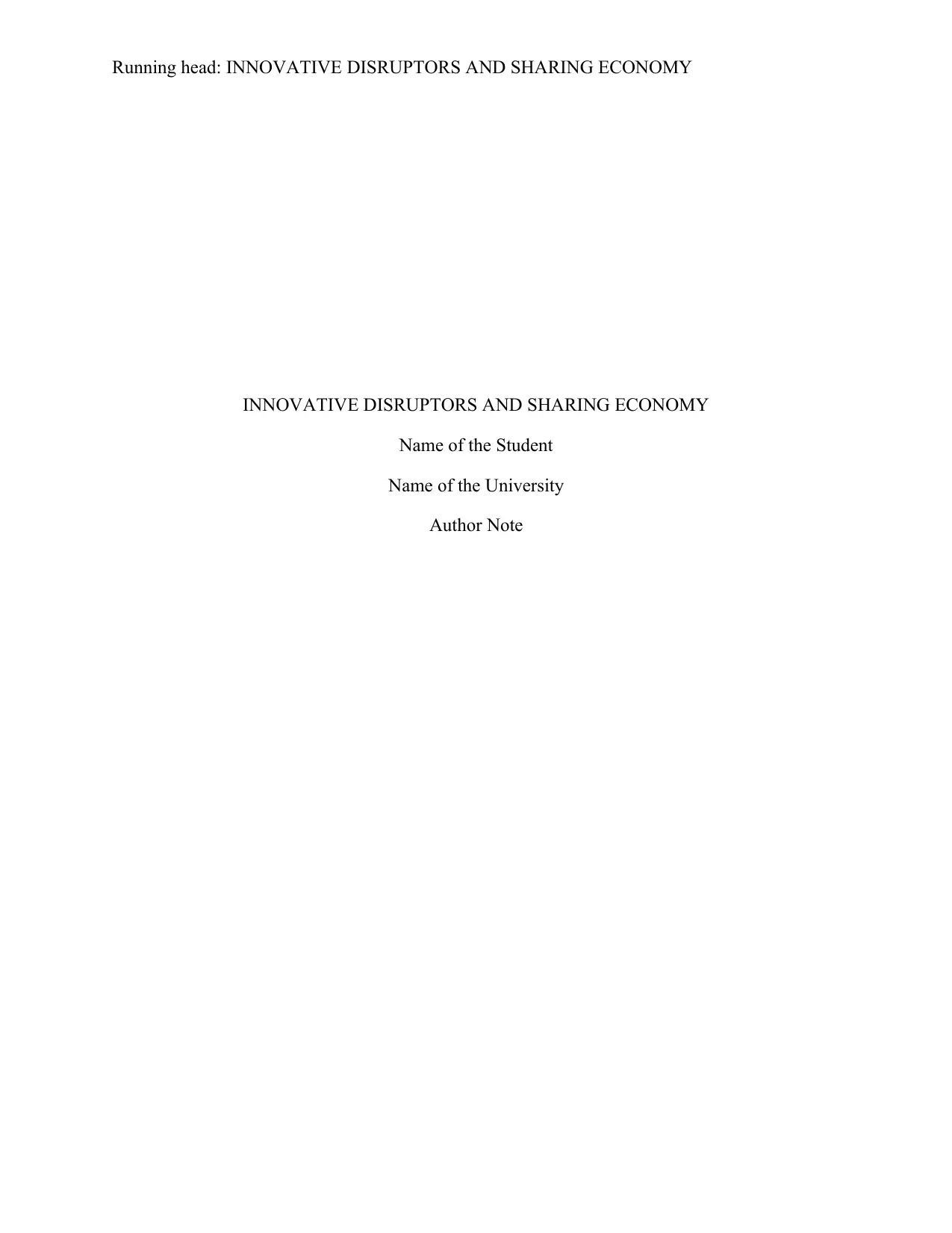
Running head: INNOVATIVE DISRUPTORS AND SHARING ECONOMY
INNOVATIVE DISRUPTORS AND SHARING ECONOMY
Name of the Student
Name of the University
Author Note
INNOVATIVE DISRUPTORS AND SHARING ECONOMY
Name of the Student
Name of the University
Author Note
Paraphrase This Document
Need a fresh take? Get an instant paraphrase of this document with our AI Paraphraser
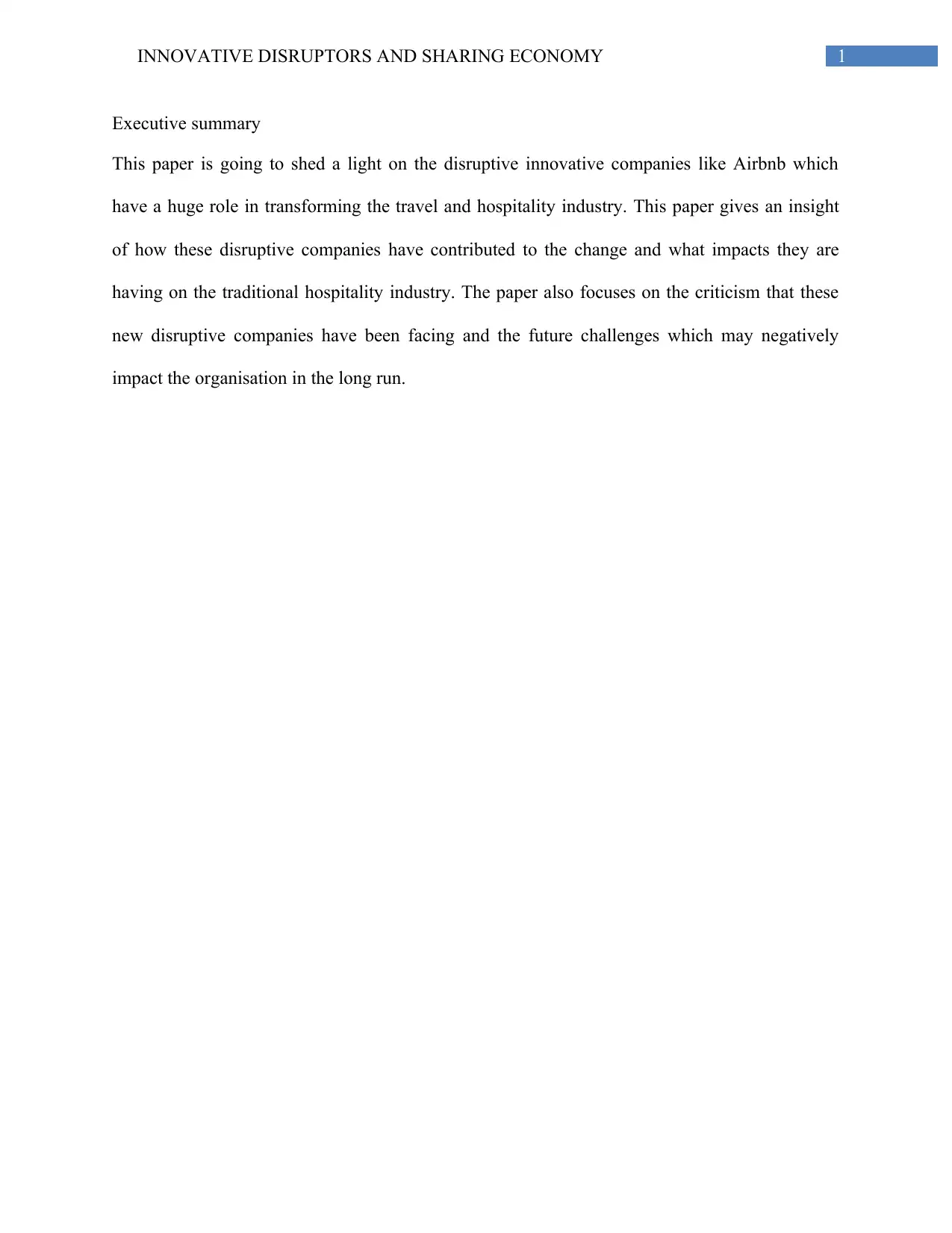
1INNOVATIVE DISRUPTORS AND SHARING ECONOMY
Executive summary
This paper is going to shed a light on the disruptive innovative companies like Airbnb which
have a huge role in transforming the travel and hospitality industry. This paper gives an insight
of how these disruptive companies have contributed to the change and what impacts they are
having on the traditional hospitality industry. The paper also focuses on the criticism that these
new disruptive companies have been facing and the future challenges which may negatively
impact the organisation in the long run.
Executive summary
This paper is going to shed a light on the disruptive innovative companies like Airbnb which
have a huge role in transforming the travel and hospitality industry. This paper gives an insight
of how these disruptive companies have contributed to the change and what impacts they are
having on the traditional hospitality industry. The paper also focuses on the criticism that these
new disruptive companies have been facing and the future challenges which may negatively
impact the organisation in the long run.
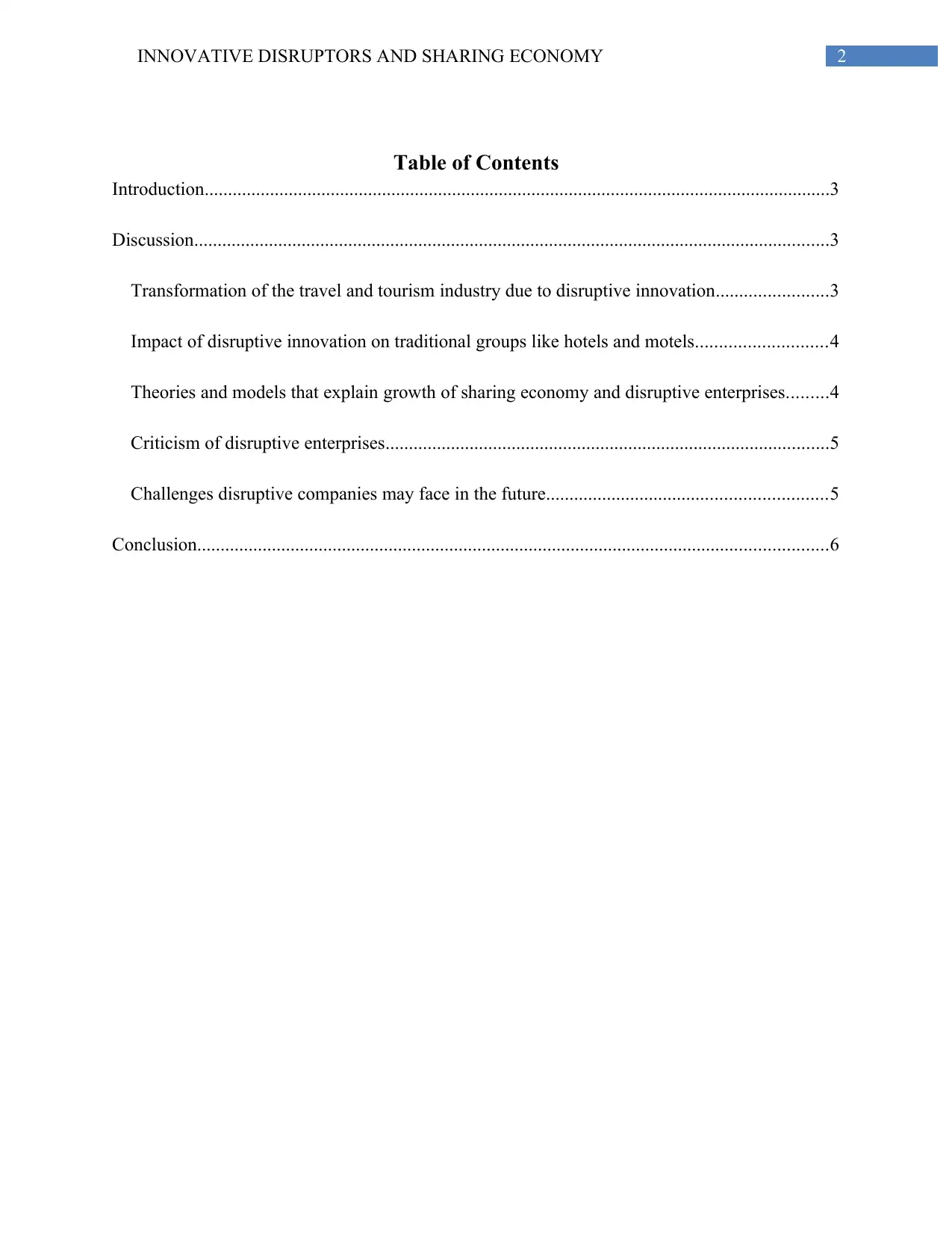
2INNOVATIVE DISRUPTORS AND SHARING ECONOMY
Table of Contents
Introduction......................................................................................................................................3
Discussion........................................................................................................................................3
Transformation of the travel and tourism industry due to disruptive innovation........................3
Impact of disruptive innovation on traditional groups like hotels and motels............................4
Theories and models that explain growth of sharing economy and disruptive enterprises.........4
Criticism of disruptive enterprises...............................................................................................5
Challenges disruptive companies may face in the future............................................................5
Conclusion.......................................................................................................................................6
Table of Contents
Introduction......................................................................................................................................3
Discussion........................................................................................................................................3
Transformation of the travel and tourism industry due to disruptive innovation........................3
Impact of disruptive innovation on traditional groups like hotels and motels............................4
Theories and models that explain growth of sharing economy and disruptive enterprises.........4
Criticism of disruptive enterprises...............................................................................................5
Challenges disruptive companies may face in the future............................................................5
Conclusion.......................................................................................................................................6
⊘ This is a preview!⊘
Do you want full access?
Subscribe today to unlock all pages.

Trusted by 1+ million students worldwide
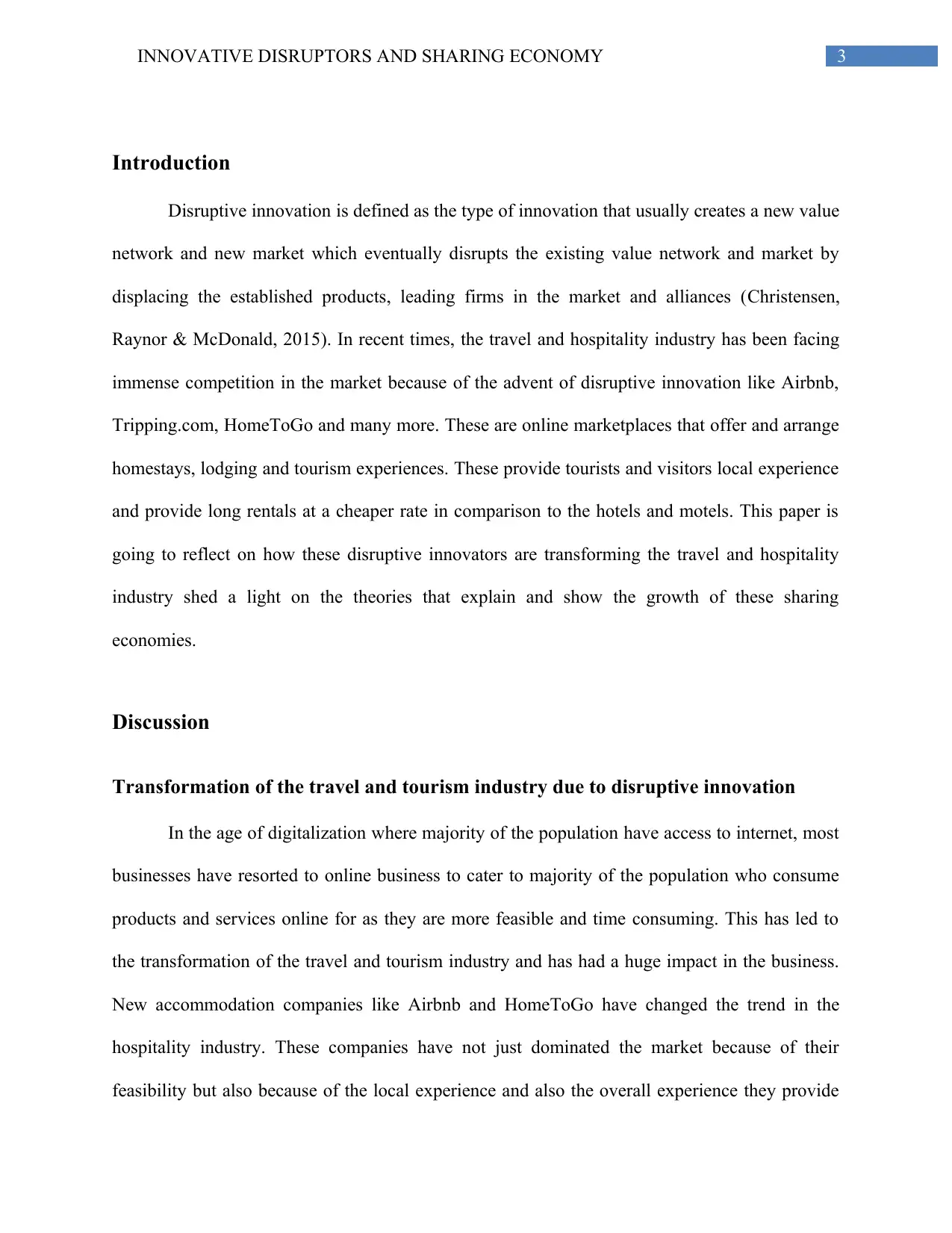
3INNOVATIVE DISRUPTORS AND SHARING ECONOMY
Introduction
Disruptive innovation is defined as the type of innovation that usually creates a new value
network and new market which eventually disrupts the existing value network and market by
displacing the established products, leading firms in the market and alliances (Christensen,
Raynor & McDonald, 2015). In recent times, the travel and hospitality industry has been facing
immense competition in the market because of the advent of disruptive innovation like Airbnb,
Tripping.com, HomeToGo and many more. These are online marketplaces that offer and arrange
homestays, lodging and tourism experiences. These provide tourists and visitors local experience
and provide long rentals at a cheaper rate in comparison to the hotels and motels. This paper is
going to reflect on how these disruptive innovators are transforming the travel and hospitality
industry shed a light on the theories that explain and show the growth of these sharing
economies.
Discussion
Transformation of the travel and tourism industry due to disruptive innovation
In the age of digitalization where majority of the population have access to internet, most
businesses have resorted to online business to cater to majority of the population who consume
products and services online for as they are more feasible and time consuming. This has led to
the transformation of the travel and tourism industry and has had a huge impact in the business.
New accommodation companies like Airbnb and HomeToGo have changed the trend in the
hospitality industry. These companies have not just dominated the market because of their
feasibility but also because of the local experience and also the overall experience they provide
Introduction
Disruptive innovation is defined as the type of innovation that usually creates a new value
network and new market which eventually disrupts the existing value network and market by
displacing the established products, leading firms in the market and alliances (Christensen,
Raynor & McDonald, 2015). In recent times, the travel and hospitality industry has been facing
immense competition in the market because of the advent of disruptive innovation like Airbnb,
Tripping.com, HomeToGo and many more. These are online marketplaces that offer and arrange
homestays, lodging and tourism experiences. These provide tourists and visitors local experience
and provide long rentals at a cheaper rate in comparison to the hotels and motels. This paper is
going to reflect on how these disruptive innovators are transforming the travel and hospitality
industry shed a light on the theories that explain and show the growth of these sharing
economies.
Discussion
Transformation of the travel and tourism industry due to disruptive innovation
In the age of digitalization where majority of the population have access to internet, most
businesses have resorted to online business to cater to majority of the population who consume
products and services online for as they are more feasible and time consuming. This has led to
the transformation of the travel and tourism industry and has had a huge impact in the business.
New accommodation companies like Airbnb and HomeToGo have changed the trend in the
hospitality industry. These companies have not just dominated the market because of their
feasibility but also because of the local experience and also the overall experience they provide
Paraphrase This Document
Need a fresh take? Get an instant paraphrase of this document with our AI Paraphraser
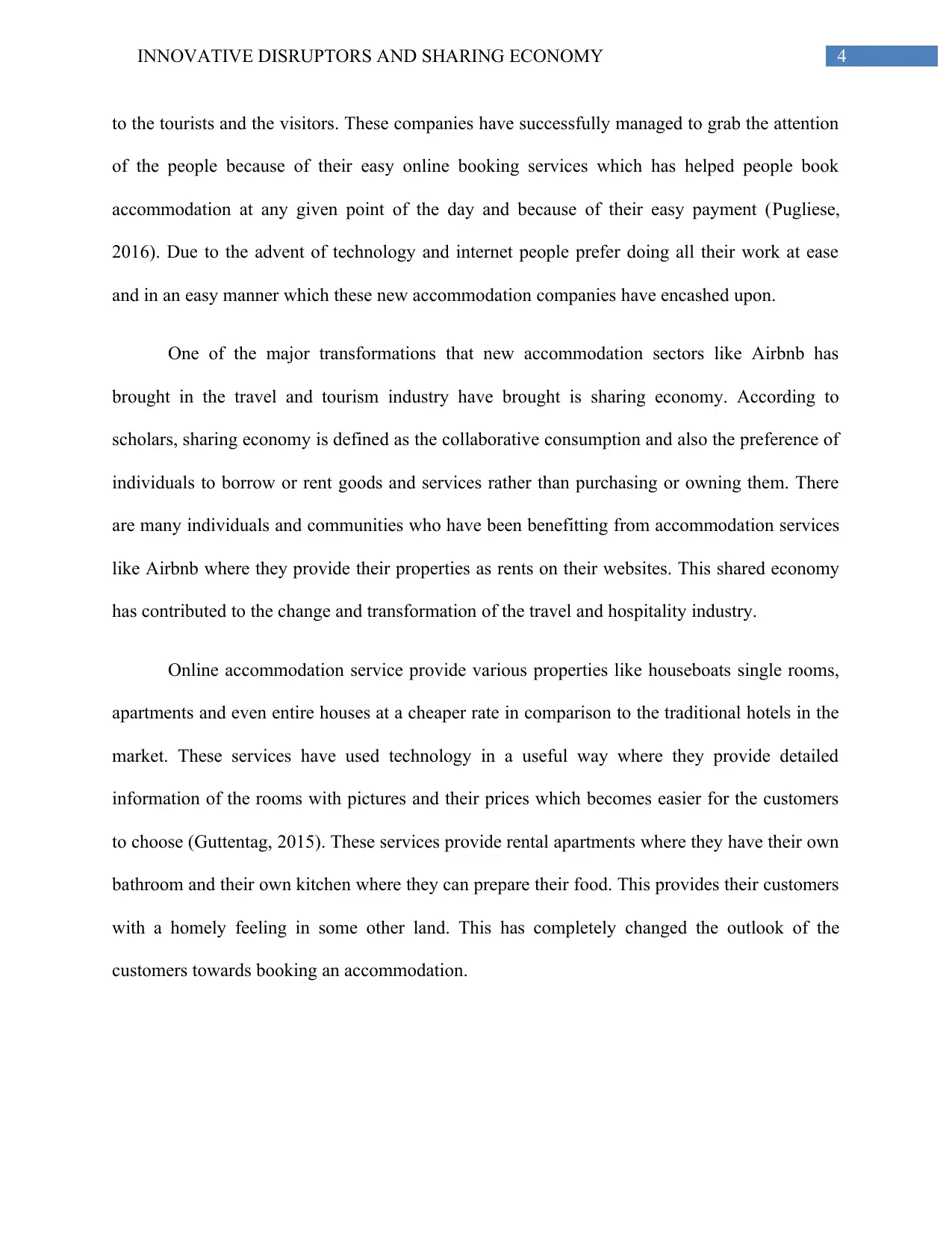
4INNOVATIVE DISRUPTORS AND SHARING ECONOMY
to the tourists and the visitors. These companies have successfully managed to grab the attention
of the people because of their easy online booking services which has helped people book
accommodation at any given point of the day and because of their easy payment (Pugliese,
2016). Due to the advent of technology and internet people prefer doing all their work at ease
and in an easy manner which these new accommodation companies have encashed upon.
One of the major transformations that new accommodation sectors like Airbnb has
brought in the travel and tourism industry have brought is sharing economy. According to
scholars, sharing economy is defined as the collaborative consumption and also the preference of
individuals to borrow or rent goods and services rather than purchasing or owning them. There
are many individuals and communities who have been benefitting from accommodation services
like Airbnb where they provide their properties as rents on their websites. This shared economy
has contributed to the change and transformation of the travel and hospitality industry.
Online accommodation service provide various properties like houseboats single rooms,
apartments and even entire houses at a cheaper rate in comparison to the traditional hotels in the
market. These services have used technology in a useful way where they provide detailed
information of the rooms with pictures and their prices which becomes easier for the customers
to choose (Guttentag, 2015). These services provide rental apartments where they have their own
bathroom and their own kitchen where they can prepare their food. This provides their customers
with a homely feeling in some other land. This has completely changed the outlook of the
customers towards booking an accommodation.
to the tourists and the visitors. These companies have successfully managed to grab the attention
of the people because of their easy online booking services which has helped people book
accommodation at any given point of the day and because of their easy payment (Pugliese,
2016). Due to the advent of technology and internet people prefer doing all their work at ease
and in an easy manner which these new accommodation companies have encashed upon.
One of the major transformations that new accommodation sectors like Airbnb has
brought in the travel and tourism industry have brought is sharing economy. According to
scholars, sharing economy is defined as the collaborative consumption and also the preference of
individuals to borrow or rent goods and services rather than purchasing or owning them. There
are many individuals and communities who have been benefitting from accommodation services
like Airbnb where they provide their properties as rents on their websites. This shared economy
has contributed to the change and transformation of the travel and hospitality industry.
Online accommodation service provide various properties like houseboats single rooms,
apartments and even entire houses at a cheaper rate in comparison to the traditional hotels in the
market. These services have used technology in a useful way where they provide detailed
information of the rooms with pictures and their prices which becomes easier for the customers
to choose (Guttentag, 2015). These services provide rental apartments where they have their own
bathroom and their own kitchen where they can prepare their food. This provides their customers
with a homely feeling in some other land. This has completely changed the outlook of the
customers towards booking an accommodation.
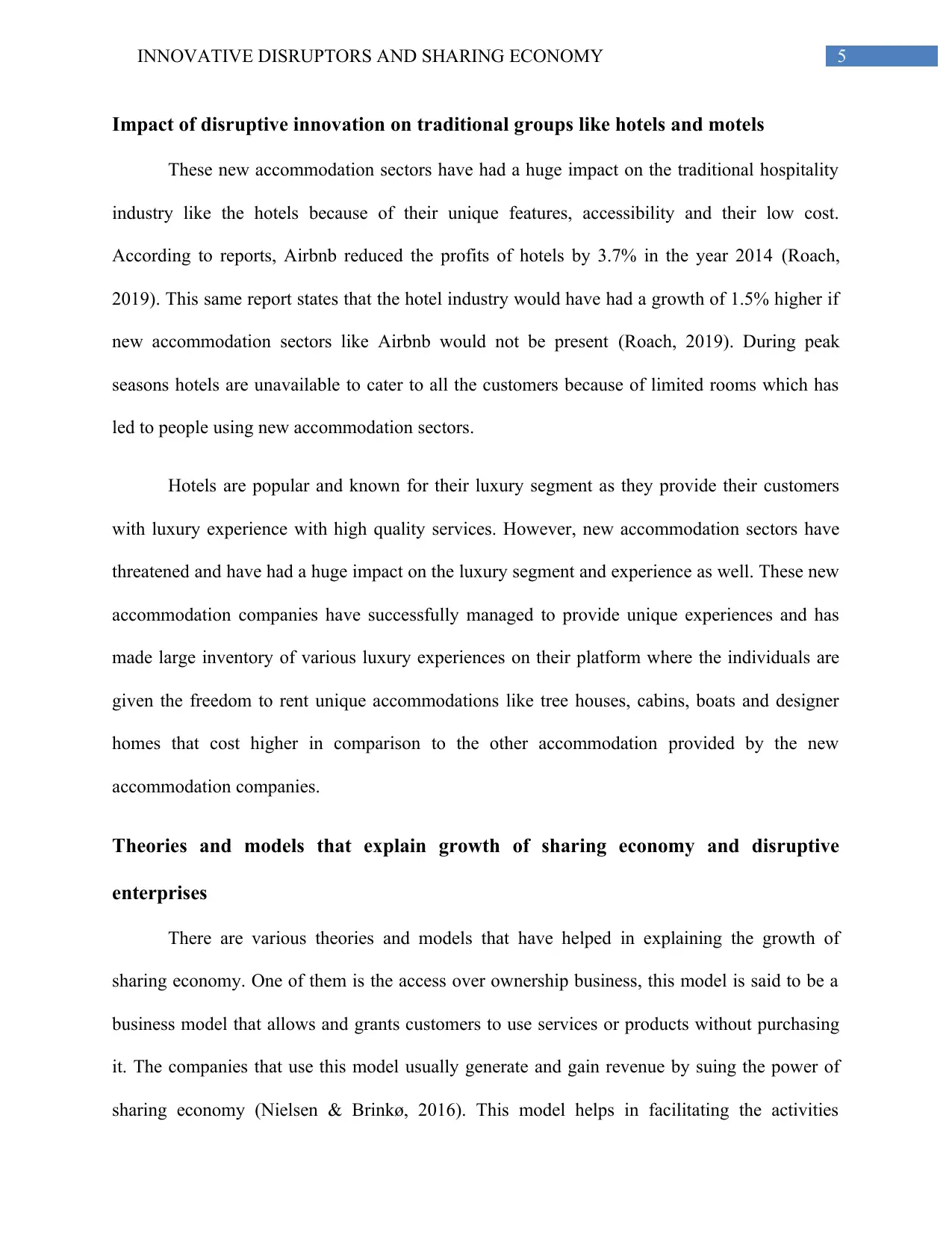
5INNOVATIVE DISRUPTORS AND SHARING ECONOMY
Impact of disruptive innovation on traditional groups like hotels and motels
These new accommodation sectors have had a huge impact on the traditional hospitality
industry like the hotels because of their unique features, accessibility and their low cost.
According to reports, Airbnb reduced the profits of hotels by 3.7% in the year 2014 (Roach,
2019). This same report states that the hotel industry would have had a growth of 1.5% higher if
new accommodation sectors like Airbnb would not be present (Roach, 2019). During peak
seasons hotels are unavailable to cater to all the customers because of limited rooms which has
led to people using new accommodation sectors.
Hotels are popular and known for their luxury segment as they provide their customers
with luxury experience with high quality services. However, new accommodation sectors have
threatened and have had a huge impact on the luxury segment and experience as well. These new
accommodation companies have successfully managed to provide unique experiences and has
made large inventory of various luxury experiences on their platform where the individuals are
given the freedom to rent unique accommodations like tree houses, cabins, boats and designer
homes that cost higher in comparison to the other accommodation provided by the new
accommodation companies.
Theories and models that explain growth of sharing economy and disruptive
enterprises
There are various theories and models that have helped in explaining the growth of
sharing economy. One of them is the access over ownership business, this model is said to be a
business model that allows and grants customers to use services or products without purchasing
it. The companies that use this model usually generate and gain revenue by suing the power of
sharing economy (Nielsen & Brinkø, 2016). This model helps in facilitating the activities
Impact of disruptive innovation on traditional groups like hotels and motels
These new accommodation sectors have had a huge impact on the traditional hospitality
industry like the hotels because of their unique features, accessibility and their low cost.
According to reports, Airbnb reduced the profits of hotels by 3.7% in the year 2014 (Roach,
2019). This same report states that the hotel industry would have had a growth of 1.5% higher if
new accommodation sectors like Airbnb would not be present (Roach, 2019). During peak
seasons hotels are unavailable to cater to all the customers because of limited rooms which has
led to people using new accommodation sectors.
Hotels are popular and known for their luxury segment as they provide their customers
with luxury experience with high quality services. However, new accommodation sectors have
threatened and have had a huge impact on the luxury segment and experience as well. These new
accommodation companies have successfully managed to provide unique experiences and has
made large inventory of various luxury experiences on their platform where the individuals are
given the freedom to rent unique accommodations like tree houses, cabins, boats and designer
homes that cost higher in comparison to the other accommodation provided by the new
accommodation companies.
Theories and models that explain growth of sharing economy and disruptive
enterprises
There are various theories and models that have helped in explaining the growth of
sharing economy. One of them is the access over ownership business, this model is said to be a
business model that allows and grants customers to use services or products without purchasing
it. The companies that use this model usually generate and gain revenue by suing the power of
sharing economy (Nielsen & Brinkø, 2016). This model helps in facilitating the activities
⊘ This is a preview!⊘
Do you want full access?
Subscribe today to unlock all pages.

Trusted by 1+ million students worldwide
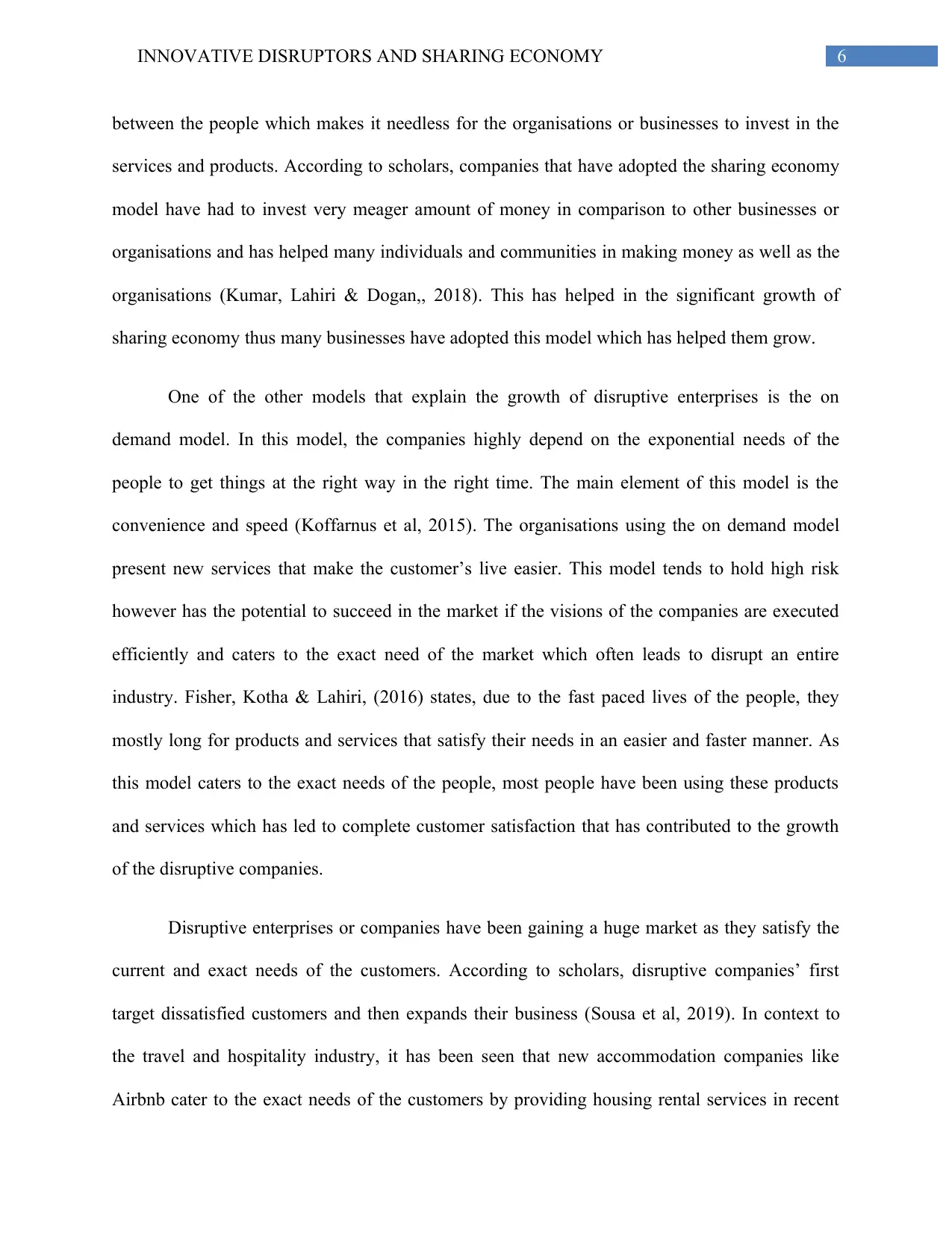
6INNOVATIVE DISRUPTORS AND SHARING ECONOMY
between the people which makes it needless for the organisations or businesses to invest in the
services and products. According to scholars, companies that have adopted the sharing economy
model have had to invest very meager amount of money in comparison to other businesses or
organisations and has helped many individuals and communities in making money as well as the
organisations (Kumar, Lahiri & Dogan,, 2018). This has helped in the significant growth of
sharing economy thus many businesses have adopted this model which has helped them grow.
One of the other models that explain the growth of disruptive enterprises is the on
demand model. In this model, the companies highly depend on the exponential needs of the
people to get things at the right way in the right time. The main element of this model is the
convenience and speed (Koffarnus et al, 2015). The organisations using the on demand model
present new services that make the customer’s live easier. This model tends to hold high risk
however has the potential to succeed in the market if the visions of the companies are executed
efficiently and caters to the exact need of the market which often leads to disrupt an entire
industry. Fisher, Kotha & Lahiri, (2016) states, due to the fast paced lives of the people, they
mostly long for products and services that satisfy their needs in an easier and faster manner. As
this model caters to the exact needs of the people, most people have been using these products
and services which has led to complete customer satisfaction that has contributed to the growth
of the disruptive companies.
Disruptive enterprises or companies have been gaining a huge market as they satisfy the
current and exact needs of the customers. According to scholars, disruptive companies’ first
target dissatisfied customers and then expands their business (Sousa et al, 2019). In context to
the travel and hospitality industry, it has been seen that new accommodation companies like
Airbnb cater to the exact needs of the customers by providing housing rental services in recent
between the people which makes it needless for the organisations or businesses to invest in the
services and products. According to scholars, companies that have adopted the sharing economy
model have had to invest very meager amount of money in comparison to other businesses or
organisations and has helped many individuals and communities in making money as well as the
organisations (Kumar, Lahiri & Dogan,, 2018). This has helped in the significant growth of
sharing economy thus many businesses have adopted this model which has helped them grow.
One of the other models that explain the growth of disruptive enterprises is the on
demand model. In this model, the companies highly depend on the exponential needs of the
people to get things at the right way in the right time. The main element of this model is the
convenience and speed (Koffarnus et al, 2015). The organisations using the on demand model
present new services that make the customer’s live easier. This model tends to hold high risk
however has the potential to succeed in the market if the visions of the companies are executed
efficiently and caters to the exact need of the market which often leads to disrupt an entire
industry. Fisher, Kotha & Lahiri, (2016) states, due to the fast paced lives of the people, they
mostly long for products and services that satisfy their needs in an easier and faster manner. As
this model caters to the exact needs of the people, most people have been using these products
and services which has led to complete customer satisfaction that has contributed to the growth
of the disruptive companies.
Disruptive enterprises or companies have been gaining a huge market as they satisfy the
current and exact needs of the customers. According to scholars, disruptive companies’ first
target dissatisfied customers and then expands their business (Sousa et al, 2019). In context to
the travel and hospitality industry, it has been seen that new accommodation companies like
Airbnb cater to the exact needs of the customers by providing housing rental services in recent
Paraphrase This Document
Need a fresh take? Get an instant paraphrase of this document with our AI Paraphraser
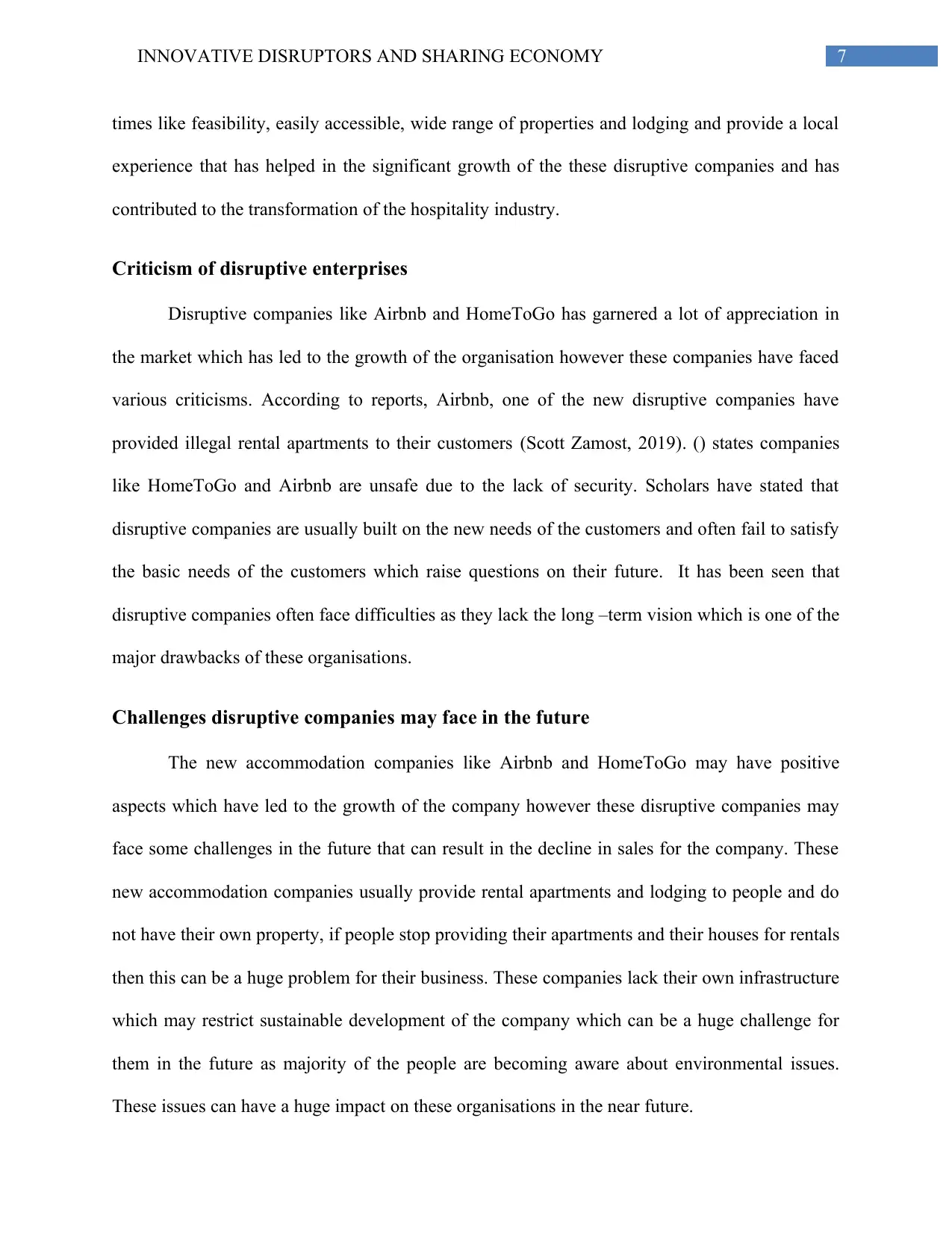
7INNOVATIVE DISRUPTORS AND SHARING ECONOMY
times like feasibility, easily accessible, wide range of properties and lodging and provide a local
experience that has helped in the significant growth of the these disruptive companies and has
contributed to the transformation of the hospitality industry.
Criticism of disruptive enterprises
Disruptive companies like Airbnb and HomeToGo has garnered a lot of appreciation in
the market which has led to the growth of the organisation however these companies have faced
various criticisms. According to reports, Airbnb, one of the new disruptive companies have
provided illegal rental apartments to their customers (Scott Zamost, 2019). () states companies
like HomeToGo and Airbnb are unsafe due to the lack of security. Scholars have stated that
disruptive companies are usually built on the new needs of the customers and often fail to satisfy
the basic needs of the customers which raise questions on their future. It has been seen that
disruptive companies often face difficulties as they lack the long –term vision which is one of the
major drawbacks of these organisations.
Challenges disruptive companies may face in the future
The new accommodation companies like Airbnb and HomeToGo may have positive
aspects which have led to the growth of the company however these disruptive companies may
face some challenges in the future that can result in the decline in sales for the company. These
new accommodation companies usually provide rental apartments and lodging to people and do
not have their own property, if people stop providing their apartments and their houses for rentals
then this can be a huge problem for their business. These companies lack their own infrastructure
which may restrict sustainable development of the company which can be a huge challenge for
them in the future as majority of the people are becoming aware about environmental issues.
These issues can have a huge impact on these organisations in the near future.
times like feasibility, easily accessible, wide range of properties and lodging and provide a local
experience that has helped in the significant growth of the these disruptive companies and has
contributed to the transformation of the hospitality industry.
Criticism of disruptive enterprises
Disruptive companies like Airbnb and HomeToGo has garnered a lot of appreciation in
the market which has led to the growth of the organisation however these companies have faced
various criticisms. According to reports, Airbnb, one of the new disruptive companies have
provided illegal rental apartments to their customers (Scott Zamost, 2019). () states companies
like HomeToGo and Airbnb are unsafe due to the lack of security. Scholars have stated that
disruptive companies are usually built on the new needs of the customers and often fail to satisfy
the basic needs of the customers which raise questions on their future. It has been seen that
disruptive companies often face difficulties as they lack the long –term vision which is one of the
major drawbacks of these organisations.
Challenges disruptive companies may face in the future
The new accommodation companies like Airbnb and HomeToGo may have positive
aspects which have led to the growth of the company however these disruptive companies may
face some challenges in the future that can result in the decline in sales for the company. These
new accommodation companies usually provide rental apartments and lodging to people and do
not have their own property, if people stop providing their apartments and their houses for rentals
then this can be a huge problem for their business. These companies lack their own infrastructure
which may restrict sustainable development of the company which can be a huge challenge for
them in the future as majority of the people are becoming aware about environmental issues.
These issues can have a huge impact on these organisations in the near future.
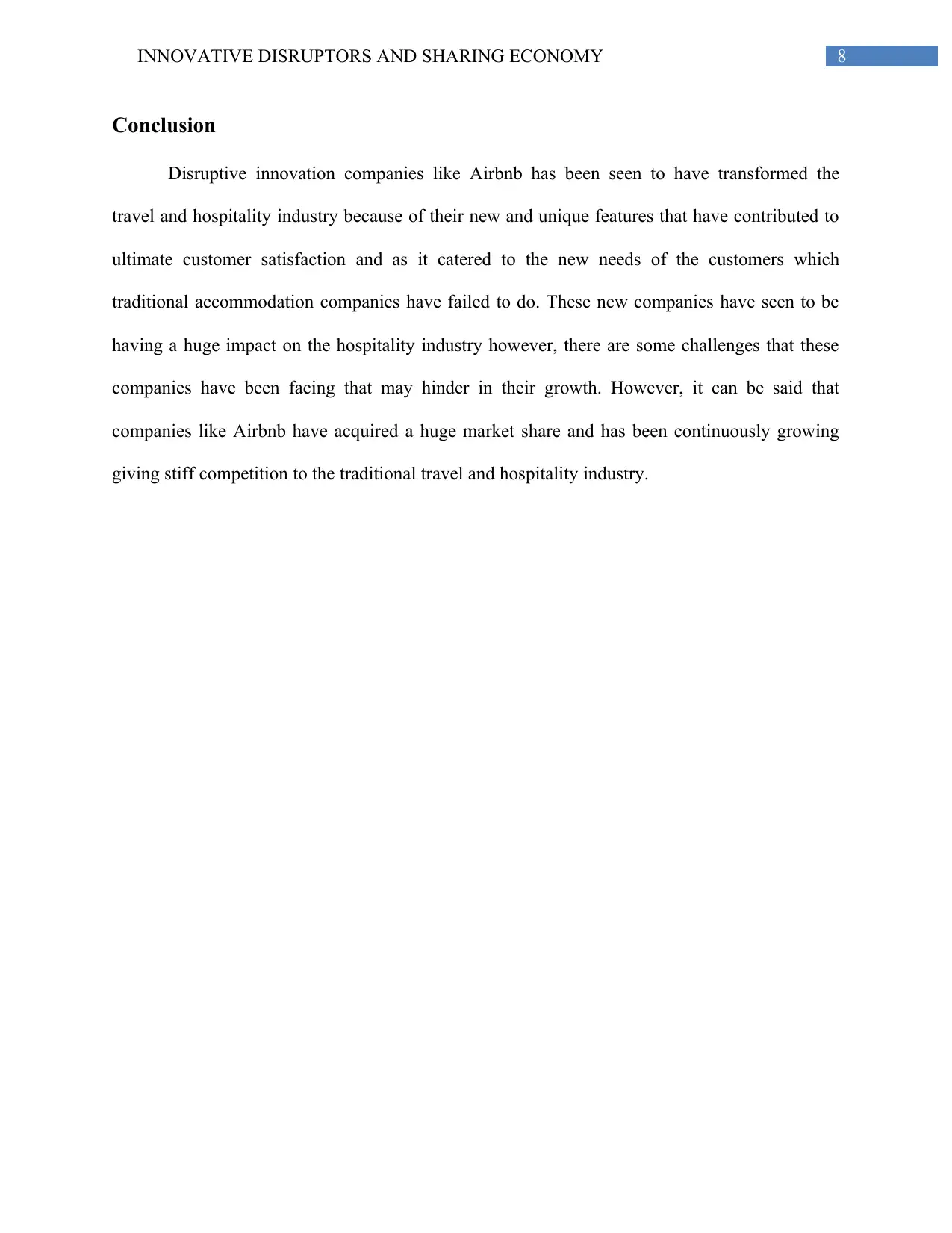
8INNOVATIVE DISRUPTORS AND SHARING ECONOMY
Conclusion
Disruptive innovation companies like Airbnb has been seen to have transformed the
travel and hospitality industry because of their new and unique features that have contributed to
ultimate customer satisfaction and as it catered to the new needs of the customers which
traditional accommodation companies have failed to do. These new companies have seen to be
having a huge impact on the hospitality industry however, there are some challenges that these
companies have been facing that may hinder in their growth. However, it can be said that
companies like Airbnb have acquired a huge market share and has been continuously growing
giving stiff competition to the traditional travel and hospitality industry.
Conclusion
Disruptive innovation companies like Airbnb has been seen to have transformed the
travel and hospitality industry because of their new and unique features that have contributed to
ultimate customer satisfaction and as it catered to the new needs of the customers which
traditional accommodation companies have failed to do. These new companies have seen to be
having a huge impact on the hospitality industry however, there are some challenges that these
companies have been facing that may hinder in their growth. However, it can be said that
companies like Airbnb have acquired a huge market share and has been continuously growing
giving stiff competition to the traditional travel and hospitality industry.
⊘ This is a preview!⊘
Do you want full access?
Subscribe today to unlock all pages.

Trusted by 1+ million students worldwide
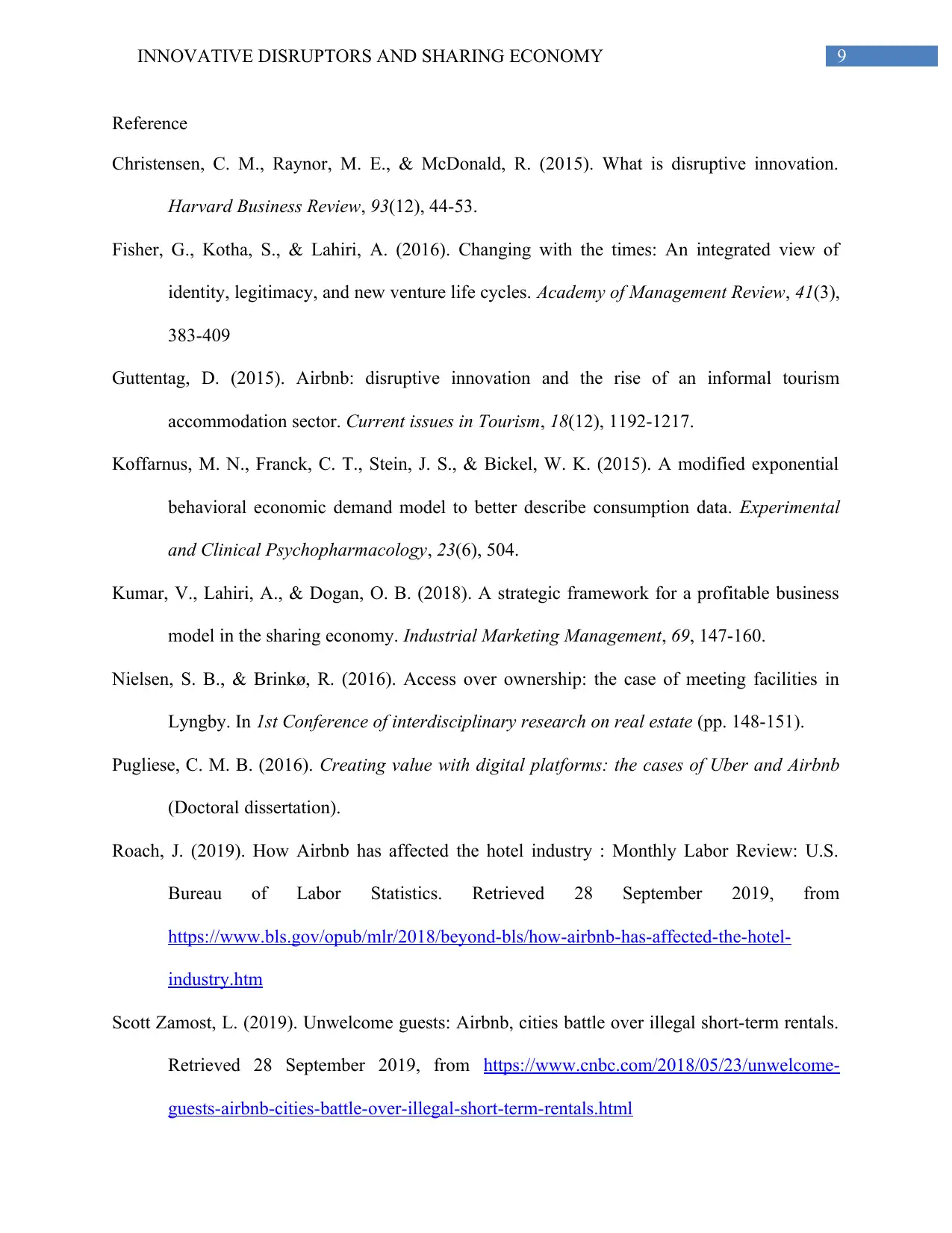
9INNOVATIVE DISRUPTORS AND SHARING ECONOMY
Reference
Christensen, C. M., Raynor, M. E., & McDonald, R. (2015). What is disruptive innovation.
Harvard Business Review, 93(12), 44-53.
Fisher, G., Kotha, S., & Lahiri, A. (2016). Changing with the times: An integrated view of
identity, legitimacy, and new venture life cycles. Academy of Management Review, 41(3),
383-409
Guttentag, D. (2015). Airbnb: disruptive innovation and the rise of an informal tourism
accommodation sector. Current issues in Tourism, 18(12), 1192-1217.
Koffarnus, M. N., Franck, C. T., Stein, J. S., & Bickel, W. K. (2015). A modified exponential
behavioral economic demand model to better describe consumption data. Experimental
and Clinical Psychopharmacology, 23(6), 504.
Kumar, V., Lahiri, A., & Dogan, O. B. (2018). A strategic framework for a profitable business
model in the sharing economy. Industrial Marketing Management, 69, 147-160.
Nielsen, S. B., & Brinkø, R. (2016). Access over ownership: the case of meeting facilities in
Lyngby. In 1st Conference of interdisciplinary research on real estate (pp. 148-151).
Pugliese, C. M. B. (2016). Creating value with digital platforms: the cases of Uber and Airbnb
(Doctoral dissertation).
Roach, J. (2019). How Airbnb has affected the hotel industry : Monthly Labor Review: U.S.
Bureau of Labor Statistics. Retrieved 28 September 2019, from
https://www.bls.gov/opub/mlr/2018/beyond-bls/how-airbnb-has-affected-the-hotel-
industry.htm
Scott Zamost, L. (2019). Unwelcome guests: Airbnb, cities battle over illegal short-term rentals.
Retrieved 28 September 2019, from https://www.cnbc.com/2018/05/23/unwelcome-
guests-airbnb-cities-battle-over-illegal-short-term-rentals.html
Reference
Christensen, C. M., Raynor, M. E., & McDonald, R. (2015). What is disruptive innovation.
Harvard Business Review, 93(12), 44-53.
Fisher, G., Kotha, S., & Lahiri, A. (2016). Changing with the times: An integrated view of
identity, legitimacy, and new venture life cycles. Academy of Management Review, 41(3),
383-409
Guttentag, D. (2015). Airbnb: disruptive innovation and the rise of an informal tourism
accommodation sector. Current issues in Tourism, 18(12), 1192-1217.
Koffarnus, M. N., Franck, C. T., Stein, J. S., & Bickel, W. K. (2015). A modified exponential
behavioral economic demand model to better describe consumption data. Experimental
and Clinical Psychopharmacology, 23(6), 504.
Kumar, V., Lahiri, A., & Dogan, O. B. (2018). A strategic framework for a profitable business
model in the sharing economy. Industrial Marketing Management, 69, 147-160.
Nielsen, S. B., & Brinkø, R. (2016). Access over ownership: the case of meeting facilities in
Lyngby. In 1st Conference of interdisciplinary research on real estate (pp. 148-151).
Pugliese, C. M. B. (2016). Creating value with digital platforms: the cases of Uber and Airbnb
(Doctoral dissertation).
Roach, J. (2019). How Airbnb has affected the hotel industry : Monthly Labor Review: U.S.
Bureau of Labor Statistics. Retrieved 28 September 2019, from
https://www.bls.gov/opub/mlr/2018/beyond-bls/how-airbnb-has-affected-the-hotel-
industry.htm
Scott Zamost, L. (2019). Unwelcome guests: Airbnb, cities battle over illegal short-term rentals.
Retrieved 28 September 2019, from https://www.cnbc.com/2018/05/23/unwelcome-
guests-airbnb-cities-battle-over-illegal-short-term-rentals.html
Paraphrase This Document
Need a fresh take? Get an instant paraphrase of this document with our AI Paraphraser
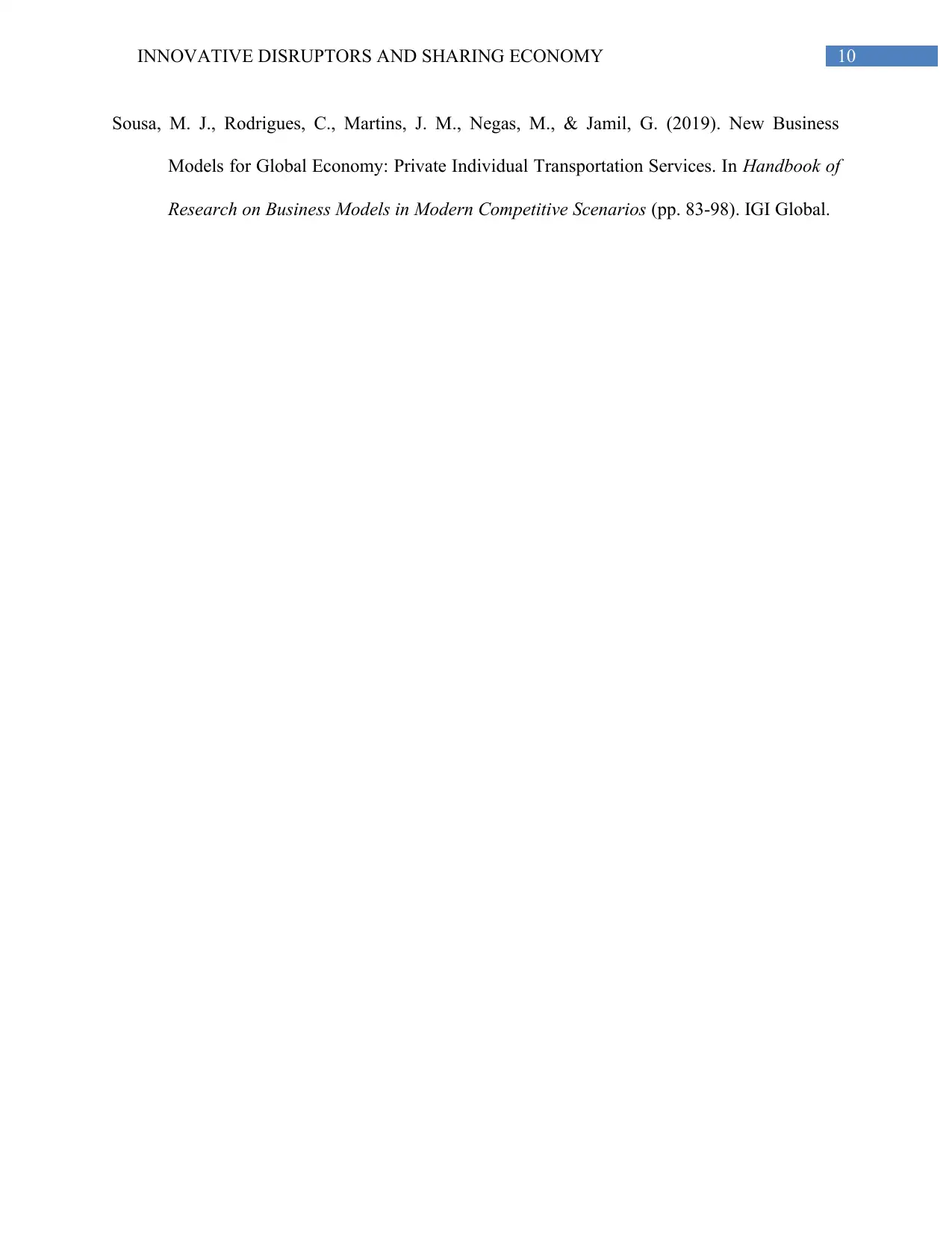
10INNOVATIVE DISRUPTORS AND SHARING ECONOMY
Sousa, M. J., Rodrigues, C., Martins, J. M., Negas, M., & Jamil, G. (2019). New Business
Models for Global Economy: Private Individual Transportation Services. In Handbook of
Research on Business Models in Modern Competitive Scenarios (pp. 83-98). IGI Global.
Sousa, M. J., Rodrigues, C., Martins, J. M., Negas, M., & Jamil, G. (2019). New Business
Models for Global Economy: Private Individual Transportation Services. In Handbook of
Research on Business Models in Modern Competitive Scenarios (pp. 83-98). IGI Global.

11INNOVATIVE DISRUPTORS AND SHARING ECONOMY
.
.
⊘ This is a preview!⊘
Do you want full access?
Subscribe today to unlock all pages.

Trusted by 1+ million students worldwide
1 out of 12
Related Documents
Your All-in-One AI-Powered Toolkit for Academic Success.
+13062052269
info@desklib.com
Available 24*7 on WhatsApp / Email
![[object Object]](/_next/static/media/star-bottom.7253800d.svg)
Unlock your academic potential
Copyright © 2020–2026 A2Z Services. All Rights Reserved. Developed and managed by ZUCOL.





